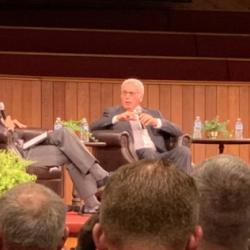We have a guest post today. Bethany Mannon is Assistant Professor of English at Appalachian State University, specializing in Rhetoric and Writing Studies. She has a new book out from Baylor University Press, entitled I Grew Up in the Church: How American Evangelical Women Tell Their Stories, which has been getting some very good responses. She kindly agreed to reflect further on her work in this blog post.
How American Evangelical Women Tell Their Stories
Bethany Mannon
In my new book I Grew Up in the Church: How American Evangelical Women Tell Their Stories, I argue that contemporary women are shifting evangelical discourse away from the combative rhetoric and emphasis on certainty that long characterized how evangelicals participate in public life. They do this in many ways, but an increasingly prominent strategy is writing and circulating their personal narratives. Writers like Rachel Held Evans and Austin Channing Brown gain wide audience in bestselling memoirs like Searching for Sunday: Loving, Leaving, and Finding the Church and I’m Still Here: Black Dignity in a World Made for Whiteness. By recounting their own experiences, they wade into the debates troubling the evangelical movement.
I first became interested in evangelical women’s rhetoric when Beth Moore posted two now-famous tweets. On October 9th, 2016, she wrote:
Moore was responding to evangelical support of Donald Trump following leaked audio of his “locker room talk” during the 2016 presidential campaign. A few minutes later she followed with a second tweet:
I was familiar with Moore as a ubiquitous Bible study leader and author of women’s devotional books. I grew up in the church, as the saying goes, and I remember that my mother had Moore’s study of John’s gospel and her 2007 book Get Out of That Pit: Straight Talk about God’s Deliverance. In 2016 I saw Moore in a new light: as someone who spoke from personal experience to confront sexism and conservative politics in the evangelical movement.
Women have a long tradition of telling individual stories to make arguments that extend beyond their own experiences. As feminists of the mid-20th century said, “the personal is political.” Historically, forms like personal essays and autobiographies were available to women who were discouraged or prohibited from public oratory. Examples include the medieval mystics Julian of Norwich and Margery Kempe, the American preachers Jarena Lee and Julia Foote, and reformers like Frances Willard and Phoebe Palmer. By using personal narrative as skillful responses to their patriarchal contexts, these spiritual and literary foremothers prepared a path for modern writers to follow.
In particular, I argue that in the twenty-first century personal narratives narrow the gulf between feminist and evangelical worldviews. They mobilize women to critique the nature and impacts of mainstream evangelical rhetoric. In my book, I write:
As they join debates about religion, culture, and politics, women’s personal narratives seek to shift the foundations of evangelical argument. They question commonplaces like certainty and individualism or the fear, combat, and authoritarianism that Labberton describes. Instead, their stories use principles of feminist rhetoric: “logos based on dialogue and understanding, ethos rooted in experience, and pathos aligned with emotion” (Glenn 2018a, 4). Rather than make claims to objective truth, they attend to “the scandalous particularity” of the writer’s moment and place (Evans, 2018a, 170). They embrace the subjective experiences and embodied perspectives that are the building blocks of faith, service, and community.
This argument seems so important to me because evangelicalism is concerned with persuading audiences and shaping worldviews. They base these concerns in biblical texts, like the exhortation “Always be prepared to give an answer to everyone who asks you to give the reason for the hope that you have” (1 Peter 3:15). Evangelicals who believe in spreading the gospel and interpreting texts faithfully develop a deep respect for the power of language. And yet, their rhetoric is often rigid, resentful, and combative.
Some of the stories that really struck me are moments when women find the rhetoric in their churches and communities to be alienating and damaging, rather than persuasive. Evans recalls a colleague, “Sam the Feminist,” who told her, “Most Christians I know are only interested in winning arguments, converts, and elections.” Sarah Bessey writes of being told at nineteen that she was “damaged goods” because of her sexual past. Wendy Alsup reflects on being taught a literalist rhetoric of the Bible that had more to do with politics than with faithful study of the text. The writers I study in I Grew Up in the Church all work to change these ways of thinking and communicating.
I was really struck when I read Austin Channing Brown’s indictment of testimonial practices in evangelical ministry. Brown writes, “I am convinced that one of the reasons white churches favor dialogue is that the parameters of dialogue can be easily manipulated to benefit whiteness. Tone policing takes priority over listening to the pain inflicted on people of color.” Instead, she calls white Christians “to listen, to pause so that people of color can clearly articulate both the disappointment they’ve endured and what it would take for reparations to be made.” Brown’s reflection shows how personal narrative participates in the evangelical rhetorical ecology. In spaces for dialogue and truth-telling, she sees white people reveal racism from their own lives in order to seek forgiveness and “the easy comfort of having spoken the confession.”
The importance of memoir in evangelical culture was brought home when Rachel Held Evans died in 2019. Readers, fellow writers, and religious leaders eulogized her as a public theologian and a voice who challenged the evangelical establishment. Kristin Kobes Du Mez wrote:
When the history of early twentieth-first-century American Christianity is written—certainly the history of American evangelicalism—she deserves a prominent place. Perhaps more importantly, she will forever hold a prominent place in the faith journeys of countless women and men. She showed a different way to be a Christian woman, a different way to love the Bible, a different way to be a Christ follower.
Evans did this not as the leader of an evangelical institution or a seminary-trained theologian. Instead, she used the accessible, enjoyable genre of personal narrative. In her hands, memoirs and personal essays became ways to craft arguments and explore theology. Her narratives showed the problems with practices like apologetics that insist on being certain in one’s beliefs and are best suited for combat with ideological opponents. She offered an alternative: ways of talking about faith and experience that bring subjectivity to the table and respect the dignity of the listener.
I Grew Up in the Church ultimately offers a hopeful argument. Narratives are engaging and entertaining, but they also have the power of “changing minds, changing motives, and changing worlds” (Engels 2015, 14). Through their stories, evangelical women illustrate the possibility of renewal after years of division and conflict.

















